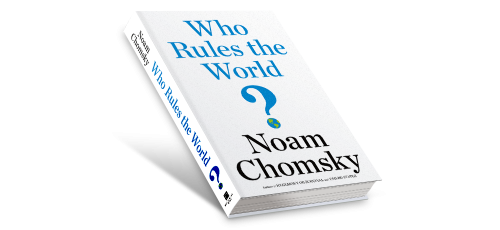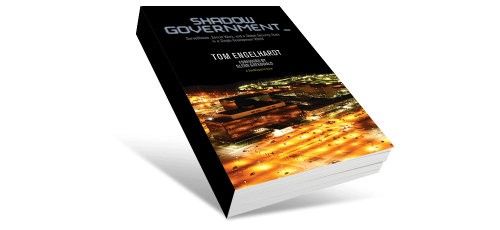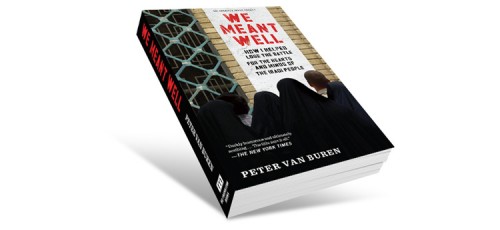The Blog
Recent Posts by American Empire Project Authors and other Influencers

Masters of Mankind (Part 1)
by Noam Chomsky
[This piece, the first of two parts, is excerpted from Noam Chomsky’s new book, Who Rules the World? Part 2 will be posted on Tuesday morning.] When we ask “Who rules the world?” we commonly adopt the standard convention that the actors in world affairs are states, primarily the great powers, and we consider their decisions and the relations among them. That is not wrong. But we would do well to keep in mind that this level of abstraction can also be highly misleading. States of course have complex internal structures, and the choices and decisions of the political leadership are heavily influenced by internal concentrations of power, while the general population is often marginalized. That is true even for the more democratic societies, and obviously for others. We cannot gain a realistic understanding of who rules the world while ignoring the “masters of mankind,” as Adam Smith called them: […]

What Trumps the Horrors of a Hellscape? The Donald!
by Nick Turse
LEER, South Sudan — I’m sitting in the dark, sweating. The blinding white sun has long since set, but it’s still in the high 90s, which is a relief since it was above 110 earlier. Slumped in a blue plastic chair, I’m thinking back on the day, trying to process everything I saw, the people I spoke with: the woman whose home was burned down, the woman whose teenage daughter was shot and killed, the woman with 10 mouths to feed and no money, the glassy-eyed soldier with the AK-47. Then there were the scorched ruins: the wrecked houses, the traditional wattle-and-daub tukuls without roofs, the spectral footprints of homes set aflame by armed raiders who swept through in successive waves, the remnants of a town that has ceased to exist. And, of course, there were the human remains: a field of scattered skulls and femurs and ribs and pelvises […]

The Collapse of the Old Oil Order
by Michael Klare
Sunday, April 17th was the designated moment. The world’s leading oil producers were expected to bring fresh discipline to the chaotic petroleum market and spark a return to high prices. Meeting in Doha, the glittering capital of petroleum-rich Qatar, the oil ministers of the Organization of the Petroleum Exporting Countries (OPEC), along with such key non-OPEC producers as Russia and Mexico, were scheduled to ratify a draft agreement obliging them to freeze their oil output at current levels. In anticipation of such a deal, oil prices had begun to creep inexorably upward, from $30 per barrel in mid-January to $43 on the eve of the gathering. But far from restoring the old oil order, the meeting ended in discord, driving prices down again and revealing deep cracks in the ranks of global energy producers. It is hard to overstate the significance of the Doha debacle. At the very least, it […]

He’s a Sign of American Decline (Just Not in the Way You Think)
by Tom Engelhardt
“Low-energy Jeb.” “Little Marco.” “Lyin’ Ted.” “Crooked Hillary.” Give Donald Trump credit. He has a memorable way with insults. His have a way of etching themselves on the brain. And they’ve garnered media coverage, analysis, and commentary almost beyond imagining. Memorable as they might be, however, they won’t be what last of Trump’s 2016 election run. That’s surely reserved for a single slogan that will sum up his candidacy when it’s all over (no matter how it ends). He arrived with it on that Trump Tower escalator in the first moments of his campaign and it now headlines his website, where it’s also emblazoned on an array of products from hats to t-shirts. You already know which line I mean: “Make America Great Again!” With that exclamation point ensuring that you won’t miss the hyperbolic, Trumpian nature of its promise to return the country to its former glory days. In […]

(And If You Believe That, You’ll Believe Anything)
by Tom Engelhardt
Think of the 2016 presidential campaign as the political equivalent of Batman v. Superman: Dawn of Justice. It’s loud; there are plenty of abusive special effects; the critics hate it, but the crowds turn out; a media company or three rake in the dough; and foreigners can’t get enough of this new vision of the American way of life — or is it of a Bizarro world? If you prefer, you could think of Campaign 2016, the never-ending blockbuster, as an affirmation that, whatever the hell this country is, it’s still, like Hollywood, at the top of the heap. When it comes to gluing eyeballs, it remains the “sole superpower” on Planet Earth. Think of it, in fact, any way you like, but just notice that the only thing you can’t do is not think about it. This came to my mind recently on my daily trip to the gym. […]

How the United States Became a Prisoner of War and Congress Went MIA
by Andrew Bacevich
Let’s face it: in times of war, the Constitution tends to take a beating. With the safety or survival of the nation said to be at risk, the basic law of the land — otherwise considered sacrosanct — becomes nonbinding, subject to being waived at the whim of government authorities who are impatient, scared, panicky, or just plain pissed off. The examples are legion. During the Civil War, Abraham Lincoln arbitrarily suspended the writ of habeas corpus and ignored court orders that took issue with his authority to do so. After U.S. entry into World War I, the administration of Woodrow Wilson mounted a comprehensive effort to crush dissent, shutting down anti-war publications in complete disregard of the First Amendment. Amid the hysteria triggered by Pearl Harbor, Franklin Roosevelt issued an executive order consigning to concentration camps more than 100,000 Japanese-Americans, many of them native-born citizens. Asked in 1944 to […]

How the Democrats Created a "Liberalism of the Rich"
by Thomas Frank
[This piece has been adapted from Thomas Frank’s new book, Listen, Liberal, or What Ever Happened to the Party of the People? (Metropolitan Books).] When you press Democrats on their uninspiring deeds — their lousy free trade deals, for example, or their flaccid response to Wall Street misbehavior — when you press them on any of these things, they automatically reply that this is the best anyone could have done. After all, they had to deal with those awful Republicans, and those awful Republicans wouldn’t let the really good stuff get through. They filibustered in the Senate. They gerrymandered the congressional districts. And besides, change takes a long time. Surely you don’t think the tepid-to-lukewarm things Bill Clinton and Barack Obama have done in Washington really represent the fiery Democratic soul. So let’s go to a place that does. Let’s choose a locale where Democratic rule is virtually unopposed, a […]

Entering Uncharted Territory in Washington
by Tom Engelhardt
The other week, feeling sick, I spent a day on my couch with the TV on and was reminded of an odd fact of American life. More than seven months before Election Day, you can watch the 2016 campaign for the presidency at any moment of your choosing, and that’s been true since at least late last year. There is essentially never a time when some network or news channel isn’t reporting on, discussing, debating, analyzing, speculating about, or simply drooling over some aspect of the primary campaign, of Hillary, Bernie, Ted, and above all — a million times above all — The Donald (from the violence at his rallies to the size of his hands). In case you’re young and think this is more or less the American norm, it isn’t. Or wasn’t. Truly, there is something new under the sun. Of course, in 1994 with O.J. Simpson’s white […]

Five Questions That Weren't Asked During the 2012 Presidential Debates and Are Unlikely to Be Asked in 2016
by Peter Van Buren
The nuances of foreign policy do not feature heavily in the ongoing presidential campaign. Every candidate intends to “destroy” the Islamic State; each has concerns about Russian President Vladimir Putin, North Korea, and China; every one of them will defend Israel; and no one wants to talk much about anything else — except, in the case of the Republicans, who rattle their sabers against Iran. In that light, here’s a little trip down memory lane: in October 2012, I considered five critical foreign policy questions — they form the section headings below — that were not being discussed by then-candidates Mitt Romney and Barack Obama. Romney today is a sideshow act for the current Republican circus, and Obama has started packing up his tent at the White House and producing his own foreign policy obituary. And sadly, those five questions of 2012 remain as pertinent and unraised today as they […]

The Irony of Oil Abundance
by Michael Klare
Three and a half years ago, the International Energy Agency (IEA) triggered headlines around the world by predicting that the United States would overtake Saudi Arabia to become the world’s leading oil producer by 2020 and, together with Canada, would become a net exporter of oil around 2030. Overnight, a new strain of American energy triumphalism appeared and experts began speaking of “Saudi America,” a reinvigorated U.S.A. animated by copious streams of oil and natural gas, much of it obtained through the then-pioneering technique of hydro-fracking. “This is a real energy revolution,” the Wall Street Journal crowed in an editorial heralding the IEA pronouncement. The most immediate effect of this “revolution,” its boosters proclaimed, would be to banish any likelihood of a “peak” in world oil production and subsequent petroleum scarcity. The peak oil theorists, who flourished in the early years of the twenty-first century, warned that global output was […]
